#Arctic and polar regions
Explore tagged Tumblr posts
Text
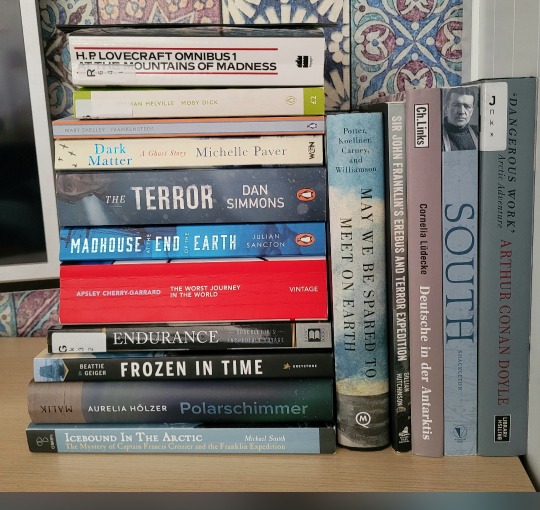

my humble stack of polar (+adjacent) books + the side view that immediately shows which ones i've read lmao
#pax posts#📓#polar exploration#i just finished Polarschimmer and i loved it tbh. (mostly) lighthearted polar fun times.#super interesting to read about contemporary polar research though i wish she'd provided more detail cherry-garrard-style but alas#ive read all of the books standing next to the stack except for South! but soon i prommy#for now im finally starting frozen in time i think. little franklin interlude for fun and me-time#also i feel like i never talk about it but ACD's arctic diary genuinely means the world to me it's so silly but i love that thang#i read the terror whenever im not in the mood for other books bc it pisses me off so bad that i regain motivation to read something else👼🏻#so progress is slow but honestly idec about her (dan simmons' the terror) like that. sorry#anyway sorry for yapping in the tags but it makes me smile i love you polar exploration i love you polar regions
45 notes
·
View notes
Text
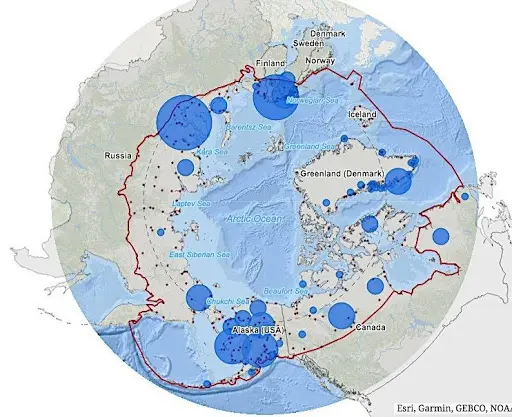
Figure 1. Indigenous populations’ distribution in the Arctic (blue circles); the AMAP Arctic boundary is shown in red Source: AMAP, Natural Earth
In popular imagination the Arctic is a harsh, dark wintery landscape, hardly the first place one associates with sunshine as a resource. Yet solar power has been increasingly taking hold above the Arctic Circle, in particular among indigenous communities with some of the strongest motivations to become energy independent and reduce the carbon emissions exacerbating climate change.
#solarpunk#solar punk#indigenous knowledge#community#jua kali solarpunk#arctic circle#polar region#solar power#renewable energy#indigenous#indigenous peoples
22 notes
·
View notes
Text
hyperfixation is really fun because i have to remind myself on a daily basis that i violently shiver in 50 degree weather and i would Not do well in a polar environment and i need to Not reroot my entire life to go live on a research outpost in antarctica
#the terror really has that effect on you huh#i have gotten SO INTO polar exploration#been discussing the polar regions extensively with my family and friends who have gone on expeditions either way#rubbing my hands together like a fly planning in my head how i will get on a boat and sail to the arctic#meanwhile it's spring in arizona and i still use a heated blanket and my teeth chatter while eating yogurt#i am NOT built for that shit 😂 but it calls to me 😂 someone help m#the terror#terrorposting
13 notes
·
View notes
Text
my greatest life struggle is suppressing the urge to go to places with polar bears...
#see i want to go to both polar regions#soooo badly#and it's infinitely easier for me to get to arctic regions than antarctica lol#also tbh the journey to antarctica scares me more...#i got them nightmares about the drake sea
8 notes
·
View notes
Text
I am once again asking people to do the bare minimum reading to understand what fitness means in evolutionary biology
#it doesn't mean fitness like strongest or buffest it means it is most adapted for its environment#a polar bear would have terrible fitness in the desert and a gila monster would have terrible fitness in the Arctic#but they have high fitness for the regions they are in!!
8 notes
·
View notes
Text
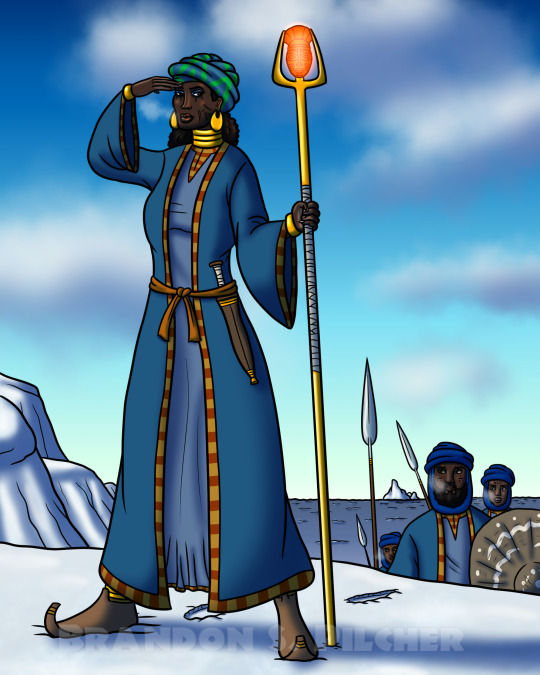
Explorers
This scholar-mage, who carries with her an enchanted staff that radiates heat, is leading an expedition to explore the icy wilds of the farthest north. This is more of a fantasy illustration than a historical one, of course, but I had in mind a West African (as in medieval Malian or Ghanaian) cultural flavor for these characters.
#fantasy#west african#african#black people#black woman#dark skin#woman of color#bipoc#arctic#polar regions#digital art#art#illustration
7 notes
·
View notes
Text
It was early July when the waters of the Beaufort Sea crept, then rushed, over the gravel spit of a remote Arctic island. For hours, the narrow strip of land, extending like the tail of a comma into the waters, gradually disappeared into the ocean.
When Canadian scientists on Qikiqtaruk (also known as Herschel Island), off the coast of Canada’s Yukon territory, surveyed the deluge, they saw a grimly comical scene unfold.
Staff from the Yukon government, slogging through the water, were rushing to move historic buildings before they could slide into the ocean. It was not the first time water had enveloped old whaling buildings, and despite the team’s efforts to prevent a sliver of history from being reclaimed by nature, it would not be the last.
Still, with the building perched on wood cribbing and with the aid of a strong cable, they were able, over a period of days, to move it 8 metres (26ft) inland.
Tempestuous weather has long been a staple of life for rangers and researchers working on the remote Arctic isle. But the relentless march of ocean waters inland has raised thorny questions about how to preserve vulnerable elements of Qikiqtaruk’s Arctic heritage.
When Richard Gordon was young, his family made the multi-day trek to Qikiqtaruk from Aklavik in a small boat. He spent summers fishing, camping and running through the remains of weather-beaten buildings.
Gordon has spent the past two decades as the lead ranger for Herschel Island-Qikiqtaruk territorial park, a witness to the landslides, permafrost thaw and floods – the ravages of the climate emergency degrading the vulnerable island.
“With the floods getting worse, all the talk is about the plans for the historic buildings. Where will they go? What should we do?” he says.
“But there is less talk about the heritage sites of the island, the places important to the Inuvialuit. There has been no decision on that. Instead, the focus is what do we do with these buildings brought in by newcomers.”
For more than 1,000 years, Qikiqtaruk has been a prized hunting, fishing and camping ground for the Inuvialuit. It occupies an important space in their oral history – and its protected status as Herschel Island-Qikiqtaruk territorial park reflects a hard-won fight to preserve it from outside influence and destruction.
With no historic written language and a pragmatic and deft way of using the land, the legacy of the Inuvialuit physical presence can easily be missed. Their sod houses, or igluryuaq, once had cooking hearths and sleeping benches and were hollowed out of the land. What remains of these structures, some of which date back to 1200, appear now as bow-shaped impressions on the land crowned with tundra flowers and grasses.
But within the oral history of the Inuvialuit is a deep catalogue of human expertise on how to thrive in the region – including on Qikiqtaruk. For a people whose language and life is braided into the lands and waters, to lose one begets a fraying of the other.
In an effort to underscore the scope of the crisis, researchers have found new ways to bring people – virtually – to the frontlines.
Recording a 360-degree vignette of life on the island, Team Shrub – researchers at the University of British Columbia – are working to preserve what they can of a landscape existing on borrowed time. The Qikiqtaruk: Arctic at Risk project aims to show an island teetering on the verge of profound ecological upheaval, hastened by a changing climate.
“The Arctic is warming four times faster than the rest of the world, and it’s making flooding worse, lengthening the ice free season,” says Eckert, a graduate student studying flood mechanics. “Every time we get a flood, which happens more because the coastline is exposed, it is washing away sandy parts of the island, making those same areas more susceptible to the next flood.”
“Polar heritage sites are among the most at risk on the planet,” says Peter Dawson, head of the anthropology and archaeology departments at the University of Calgary. “It feels like it’s a crime to let these places disappear without making an effort to save them. We can’t stop climate change, but can preserve as best we can the history of the region.”
For the team, the work is particularly important because it gives Inuvialuit residents of Aklavik – the closest community to the island – a chance to revisit the place. Many have strong ties to Qikiqtaruk, either from their youth or through stories from elders. Using the data points, the team has printed out 3D models of the island and its structures.
Self-described as “technicians of remembrance”, the team treads carefully, acknowledging the past injustices committed against the Inuvialuit, and all Indigenous peoples in Canada, in the name of “preservation”.
For decades, outsiders pillaged and plundered First Nations’ homes and villages across what is now Canada. Their art, lives and culture were coveted by outsiders and stolen under the guise of conservation.
“The land and the history is disappearing into the sea and so we’re trying to act before it disappears. But we need to ensure the community is centred in this, that knowledge is returned to them.”
Those involved in the efforts also recognise, despite the archive, the limits of such work on a place defined by the lapping ocean waters, lush vegetation and myriad species that make the island home.
“We’re in a fight against time and need to act urgently,” says Dawson. “But if we manage to digitally preserve these spaces, do we need to preserve the real version? Does this make our obligation even greater to preserve and protect the original if we still can?”
5 notes
·
View notes
Text
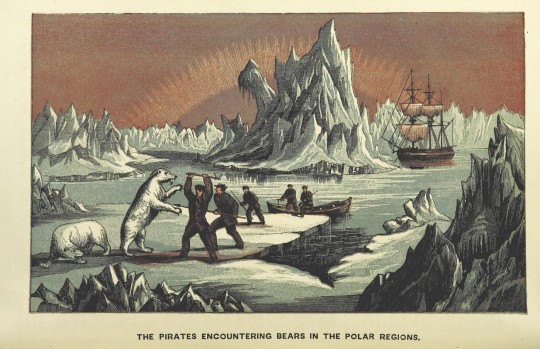
Illustration from The Frozen Crew Of The Ice-Bound Ship; Or, Terrors Of The Arctic Region: A Romance Of The Wild And Wonderful ("Penny Miscellany" Office, 1868). Artist unidentified.
2 notes
·
View notes
Text
having to read an article about sound recording and music compositions based on antarctica and having to be so, so normal about it for class
i am not succeeding, i have so many thoughts
#fueled by the fact that at a conference i found a book that has a chapter on the uncanny music used in arctic media#specifically mentioning the terror and the north water#not. helping me avoid writing a paper about the soundtracks of polar regions in media#there's something there to the experimental/electronic sounds used in the terror the north water and the thing#next investigating the long dark for similar connections as well as literally anything else that takes place in the arctic/antarctic region#anyway. school reading hit on a hyperfixation and now i'm trying not to just go !!!!!!!!!!!!!!!!!!!!!!!!!!!!!!!!!!!!!!!!!!!!! for the entir#class period.#help me. help me please
1 note
·
View note
Text
#antarctica#arctic#beluga#biodiversity#canada#candice gaukel andrews#churchill#climate change#conservation#environment#global warming#greenhouse gases#greenland#grizzly bear#hudson bay#kelp forest#natural habitat adventures#nathab#nature#pathogens#paws#permafrost#polar bears#polar regions#science#science and environment#scientific research#threatened species#travel#wild
0 notes
Text
Scientists and US Air Force officials fend off a blood-thirsty alien organism while investigating at a remote arctic outpost. Credits: TheMovieDb. Film Cast: Captain Patrick Hendry: Kenneth Tobey Nikki: Margaret Sheridan Dr. Arthur Carrington: Robert Cornthwaite Ned ‘Scotty’ Scott: Douglas Spencer Lt. Eddie Dykes: James Young Crew Chief Bob: Dewey Martin Lt. Ken ‘Mac’ Erickson: Robert Nichols Corporal Barnes: William Self Tex Richards: Nicholas Byron Dr. Stern: Eduard Franz Dr. Redding: George Fenneman Prof. Voorhees: Paul Frees Prof. Wilson: Everett Glass Dr. Lorenz: Norbert Schiller Prof. Ambrose: Edmund Breon Dr. Chapman: John Dierkes Mrs. Chapman: Sally Creighton ‘The Thing’: James Arness Gen. Fogarty: David McMahon Bill Stone (uncredited): Bill Neff Film Crew: Stunts: Sol Gorss Production Manager: Walter Daniels Music Director: Dimitri Tiomkin Screenplay: Charles Lederer Director of Photography: Russell Harlan Producer: Howard Hawks Art Direction: Albert S. D’Agostino Set Decoration: Darrell Silvera Sound: Clem Portman Director: Christian Nyby Stunts: Dick Crockett Hairstylist: Larry Germain Costume Designer: Michael Woulfe Editor: Roland Gross Stunts: Leslie Charles Makeup Supervisor: Lee Greenway Set Decoration: William Stevens Stunts: Tom Steele Associate Producer: Edward Lasker Stunts: Duke Taylor Stunts: Bob Morgan Art Direction: John Hughes Stunts: Ken Terrell Special Effects: Linwood G. Dunn Novel: John W. Campbell Jr. Stunts: Teddy Mangean Assistant Director: Arthur Siteman Sound: Phil Brigandi Special Effects: Donald Steward Camera Operator: Landon Arnett Stunts: Russell Saunders Special Effects Technician: Thol Simonson Stunts: Bill Lewin Movie Reviews: John Chard: There are no enemies in science, only phenomena to be studied. The Thing from Another World is set at The North Pole and finds a bunch of U.S. airmen, scientists and a journalist getting more than they bargained for when they investigate a space craft frozen in the ice. What is most striking about the film is the basic human story of team work, the pulling together of mankind during a crisis, this theme is a big shift from the short story by John W Campbell Jr. (Who Goes There?). Where that story and later John Carpenter’s wonderful remake focused on paranoia and mistrust, this film is something of the “polar” opposite (literally) as regards the group in peril. It bears all the hallmarks of producer Howard Hawks, who clearly influenced Nyby’s direction. The script, with its pros and cons of a military and scientific society, is very much of its time, blending po-faced observations with straight backed joviality. But this all works in the film’s favour and helps define it as one of the most important science fiction pictures ever made. Along with the other major sci-fi movie of 1951, “The Day the Earth Stood Still”, “TTFAW” firmly brought the visitor from outer space idea into the public conscious. But where the former film intellectualised the alien visitor, resplendent with a message of worth, the latter is about terror, pushing forward the notion that the visitor here is a monster that wants to drink our blood and attempt World domination. No major effects work is needed here because one of the pic’s highlights is only glimpsing the creature (James Arness) in little snippets, and this after we are made to wait for some time before things really kick off. This begs us to think for ourselves as regards this stalking menace, putting us firmly with this intrepid group of people, and we want to see them survive and we do care if they can or do succeed. The low end budget doesn’t hamper the atmosphere or flow, in fact Nyby, Hawks, cinematographer Russell Harlan and music maestro Dimitri Tiomkin, work wonders to ensure there’s a level of authenticity to the Arctic base and that peril is never far away. Not hindered by many of the clichés that would dominate similar themed genre pieces that followed it, film neatly taps into fears that were to become prevalent as the 1950s wore on. It may not be perf...
#alien invasion#alien plant-life#arctic polar circle region#base#based on novel or book#black and white#flying saucer#pilot#Top Rated Movies
0 notes
Text
#solarpunk#solar punk#indigenous knowledge#arctic circle#polar region#global warming#climate change#biodiversity#what's going on here?
6 notes
·
View notes
Text
Cultural Calendars: Water Tribe

As we all know, the Water Tribe is primarily inspired by Inuit peoples. However, there is no one standard Inuit calendar, as their traditional timekeeping systems are inextricable from the specific areas where they live. For example, the names of their months typically take inspiration from the different life stages of animals and natural phenomenon in their particular environment. Similarly, Inuit is a language family, so the vocabulary varies quite a bit from region to region. So instead of replicating one specific Inuit group or village's calendar for the Water Tribe, I thought I'd share some interesting details and commonalities I've noticed across the calendars I've looked at; from there, you can decide what to incorporate for your Water Tribe calendar.
Seasons


Inuit/Inupiat/Yupik seasons vary between 5-8 seasons, depending on the weather cycle of the particular area. The most well documented seasonal cycles (shown above) are from Nunavut, Canada in the Inuktitut language and King Island, Alaska in the Inupiatun language. Keeping track of the seasons is vital for hunter-gatherer societies.
Years & Months
I've written about the celebration of Quviasukvik aka Arctic New Year before, so I won't go too in-depth about it. The New Year for many circumpolar people is defined by the first sunrise after the Winter Solstice, as it marks the end of the polar nights, a period when the sun remains below the horizon for multiple months. Meaning that from Katara and Sokka's point of view, Aang first met Roku on New Year's Eve. ^_^
Since the ATLAverse uses a 12-month system, I figured I would use the names that Inuit groups have assigned to the months of the Gregorian calendar. Below is a graph I made of month names (translated into English) from different Inuit, Inupiat, and Yupik regions. If you click on the underlined names, you'll get a link to the sources:
(The months called "miscarriage" are in reference to February and March bring common months for seal miscarriages.)
Based off this research, here are the month names I came up with for the Water Tribe:

I didn't want to choose a specific dialect group, so I just went with English "translations". I tried to make the meanings clear, while also giving the months names that sound like month names (to an English-fluent ear).
Days of the Week
The unit of time known as a "week" wasn't really relevant to arctic peoples as they primarily tracked time based on the seasons and lunar cycles, as that's what's most important to a hunter-gatherer lifestyle. As such, I think the Water Tribes just adopted the "international" days of weeks that I mentioned here. East-day, North-day, West-day, South-day, and Center-day would be their day names; whether they'd take a break on Center-day would depend on the month/season they were in.
712 notes
·
View notes
Note
Would an albino polar bear struggle to survive in the wild? I mean...it's already white anyway
unfortunately since albinism removes protective melanin from the iris, the poor bear would probably go sun blind really quickly.
albino animals (and people!) have very light-sensitive eyes, and can suffer sun damage from just normal exposure!
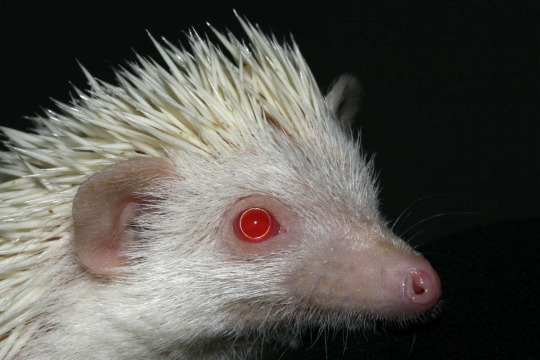
and here's the thing- the screaming white hell that is the arctic in full sun would deliver enough glare to do permanent damage in a relatively short time. there's a reason that every human society that developed in the arctic regions invented their own version of sunglasses!
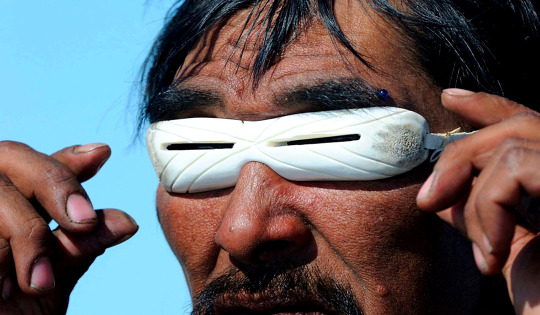
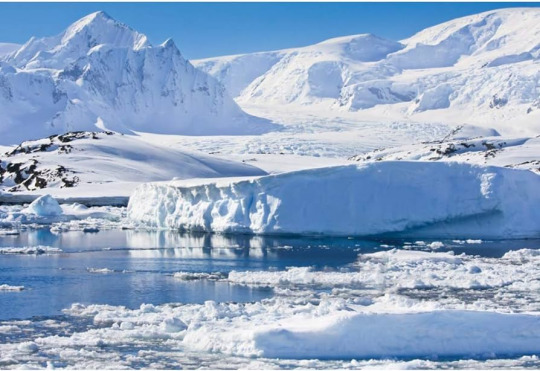
so, yeah. the unfortunate bear probably would not reach adulthood.
688 notes
·
View notes
Text
Writing Notes: Habitats
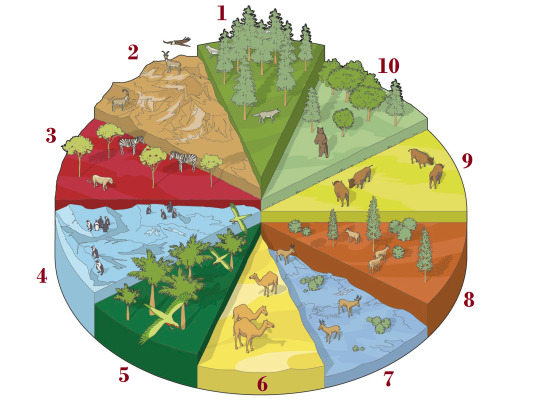
Coniferous forest - Vast areas of Scandinavia, Russia, Alaska, and Canada are the site of coniferous forests—home to moose, beavers, and wolves.
Mountain - High mountain ranges have arctic climates near the peaks, where few plants grow. Animals must cope in dangerous terrain.
Savanna - These tropical grasslands with wet and dry seasons support huge herds of grazing animals and powerful predators.
Polar ice - The ice that forms on cold oceans is a refuge for animals that hunt in the water. The continental ice sheets are almost lifeless.
Tropical rainforest - The evergreen forests that grow near the equator are the richest of all biomes, with a huge diversity of plant and animal life.
Desert - Some deserts are barren rock and sand, but many support a range of plants and animals adapted to survive the dry conditions.
Tundra - These regions on the fringes of polar ice sheets thaw out in summer and attract animals such as reindeer and nesting birds.
Mediterranean - Dry scrub regions, such as around the Mediterranean, are home to a rich insect life and drought-resistant shrubs and plants.
Temperate grassland - The dry, grassy prairies with hot summers and cold winters, support grazing herds such as antelope and bison.
Deciduous forest - In cool, moist regions, many trees grow fast in summer but lose their leaves in winter. The wildlife here changes with the seasons.
Animals, plants, and all living things are adapted to life in their natural surroundings. These environments are called habitats.
Every living species on Earth has its own favored habitat, which it shares with others. These different species interact with each other and with their natural environment—be it hot or cold, wet or dry—to create a web of life called an ecosystem.
Some ecosystems are very small, but others such as rainforests or deserts cover huge areas. These are called biomes.
Life on Land
Different climates create different types of habitats for life on land. Warm, wet places grow lush forests, for example, while hot, dry regions develop deserts. Each biome consists of many smaller habitats and, in many areas, human activity such as farming has completely changed their character.
Source ⚜ More: Writing Notes & References ⚜ Worldbuilding
#writing notes#worldbuilding#writeblr#dark academia#spilled ink#nature#writing reference#literature#writers on tumblr#writing prompt#creative writing#writing ideas#writing inspiration#poets on tumblr#poetry#writing resources
335 notes
·
View notes